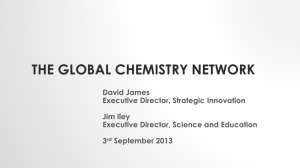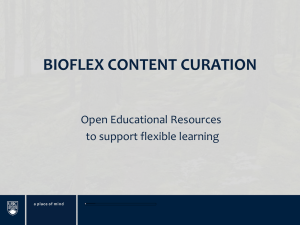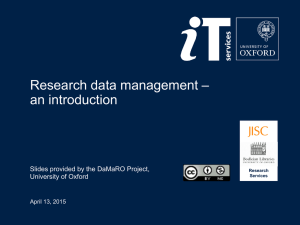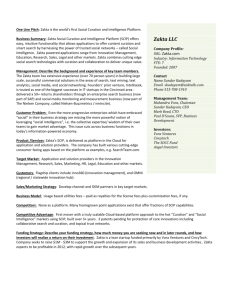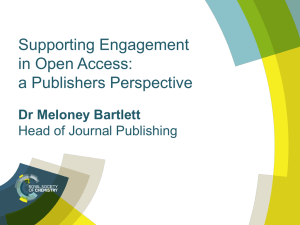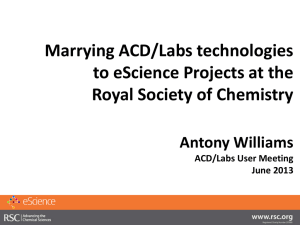Slides
advertisement
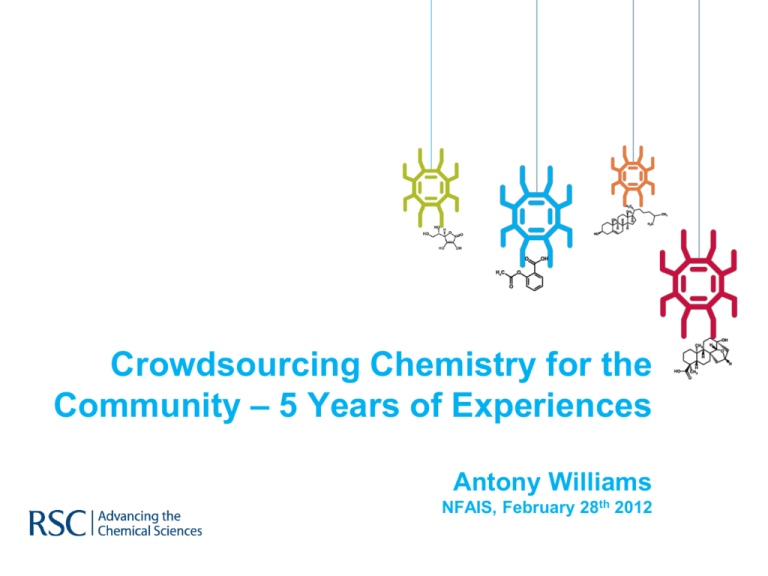
Crowdsourcing Chemistry for the Community – 5 Years of Experiences Antony Williams NFAIS, February 28th 2012 The World of Online Chemistry Safety data Toxicity data Blogs and Wikis Property databases Experimental results Scientific publications Compound aggregators Open Notebook Science Metabolic pathway databases Encyclopedic articles (Wikipedia) If it was not just about me… If it was not just about me… We might have a community built encyclopedia I might know where the best restaurants are I might get good advice on books to read I might know which movies to watch I might know which plumber to call Data might just be Open If it was not just about me… We might have a community built encyclopedia I might know where the best restaurants are I might get good advice on books to read I might know which movies to watch I might know which plumber to call Data might just be Open Collaborative Knowledge Management QUESTION Are you involved with assisting chemists, pharmaceutical scientists, etc. in sourcing information about Chemistry? 1. Yes 2. No Chemistry Databases on the Internet Public databases are “trusted” as primary sources Trust is granted without investigation of the content Online data vary dramatically in quality! Examples… With Great Fanfare… NPC Browser http://tripod.nih.gov/npc/ NPC Browser http://tripod.nih.gov/npc/ How many contribute to clean-up? Less than a dozen contributors to data The majority are project members The crowd is small… What you might not know about Chemistry Databases on the Internet Data-sharing between the databases is cyclic – proliferating errors – “Linked Data” What is the Structure of Vitamin K? MeSH A lipid cofactor that is required for normal blood clotting. Several forms of vitamin K have been identified: VITAMIN K 1 (phytomenadione) derived from plants, VITAMIN K 2 (menaquinone) from bacteria, and synthetic naphthoquinone provitamins, VITAMIN K 3 (menadione). What is the Structure of Vitamin K1? QUESTION Who has heard of ChemSpider as a chemistry database? 1. Yes 2. No ChemSpider We Want to Answer Questions Questions a chemist might ask… What is the melting point of n-heptanol? What is the chemical structure of Xanax? Chemically, what is phenolphthalein? What are the stereocenters of cholesterol? Where can I find publications about xylene? What are the different trade names for Ketoconazole? What is the NMR spectrum of Aspirin? What are the safety handling issues for Thymol Blue? Available Information… Linked to vendors, safety data, toxicity, metabolism Available Information…. Crowdsourced “Annotations” Users can add Descriptions/Syntheses/Commentaries Links to PubMed articles Links to articles via DOIs Add spectral data Add Crystallographic Information Files Add photos Add MP3 files Add Videos QUESTION Did you know that ChemSpider was OWNED by the Royal Society of Chemistry? 1. Yes 2. No Public Domain Databases Our databases are a mess… Non-curated databases are proliferating errors We source and deposit data between databases Original sources of errors hard to determine Curation is time-consuming and challenging Stop Whining – Fix it Crowdsourced Curation Crowdsourced curation: identify/tag errors, edit names, synonyms, identify records to deprecate Search “Vitamin H” “Curate” Identifiers “Curate” Identifiers Validated Name-Structure Dictionaries Chemical name dictionaries are used for: Text-mining (publications, patents) Used to index PubMed and link to Google Patents Linking to other databases – think Biology! When structures are not available drug names link Searching the web Names link to structures link to InChIs Why are Dictionaries important? The Final Search Strategy Many Names, One Structure I want to know about “Vincristine” Vincristine: Identifiers and Properties Vincristine: Patents Linked by Name Text-Mining Depends on Dictionaries Curated Dictionaries Matter Originally 15 compounds “called” Yohimbine 54 Skeletons for Yohimbine Sharing Chemspider curation Data Curation Sharing - Proof of Concept Identifier Dictionaries Reciprocal curation processes…share curation A series of “added” and “removed” synonyms against structures for matching. Announced 9 months ago – only one consumer Who will participate??? Community Contribution to ChemSpider www.SpectralGame.com http://www.jcheminf.com/content/1/1/9 Curation through “gaming” Data Curation Reversed Spectrum True Curation of Data ChemSpider SyntheticPages ChemSpider SyntheticPages Submission Process Simple template-based submission process Submissions reviewed by editorial board. Online Peer Review process Crowdsourced expansion? A few regular dedicated authors only Online peer review and feedback small but useful Crowdsourcing – does it work? 192 people EVER have deposited or curated data ChemSpider SyntheticPages small group of authors Database hosts make the largest contributions ChemSpider staff tend to do the most curation Contributions Curations 2009 – 8255 curations by 43 people 2010 – 10014 curations by 66 people 2011 – 16025 curations by 116 people “Crowdsourcing” – the crowd is small! www.SciMobileApps.com 8 contributors only…in 7 months www.SciDBs.com 7 contributors only…in 6 months www.ScientistsDB.com 38 contributors …in 6 weeks What encourages participation? “Interested” parties contribute Marketing and self-promotion are primary reasons for participation There are very few “selfless” participants Relationships garner contributions… Crowdsourcing across drug discovery Open PHACTS : partnership between European Community and European Pharma Companies Freely accessible for knowledge discovery and verification. Data on chemistry and biology Pharmacological profiles Proprietary and public data sources. How will it improve? Participation and contribution Conclusions For chemistry - crowdsourced deposition, annotation, and curation works but low engagement to date Primary challenge – engaging the community to help create what they want. Rewards and recognition? MORE collaboration can benefit us all Indicators are good for small but continued growth Thank you Email: williamsa@rsc.org Twitter: ChemConnector Personal Blog: www.chemconnector.com SLIDES: www.slideshare.net/AntonyWilliams
